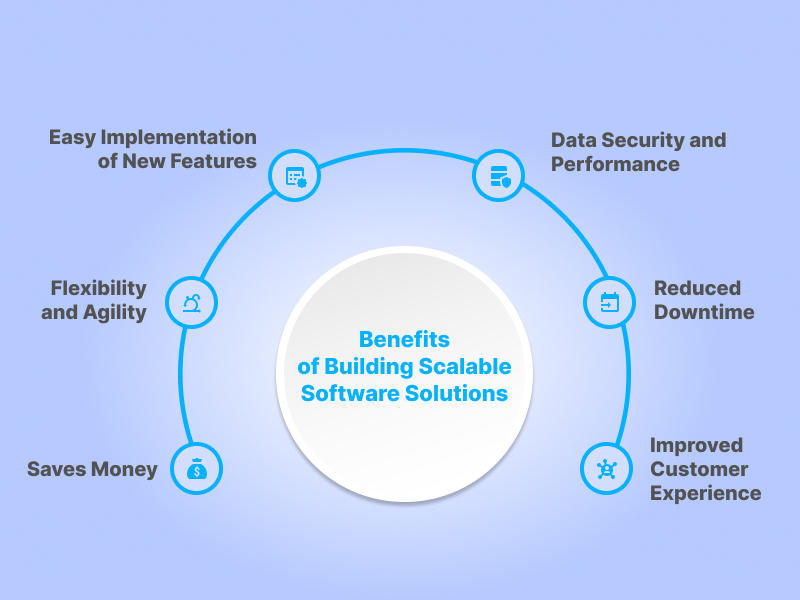Old and non-scalable software solutions can quickly become outdated, leading to lower productivity, downtime, and unsatisfied customers. To stay ahead in a dynamic marketplace, it’s essential to have software that can scale up or down as needed. Scalable software solutions offer numerous benefits, including reduced downtime, improved performance, and increased flexibility.
In this blog, we will delve deeper into the advantages of building scalable software solutions, highlighting how they help businesses succeed and stay ahead of the competition.
So, let’s explore how scaling for success with scalable software solutions can drive your business forward.
Table of Contents
What are Scalable Software Solutions?
With organizations expanding and changing over time, it is imperative to have software solutions that can scale up or down to meet the varied requirements of companies.
Scalable software solutions can be scaled up or down to meet the changing requirements as organizations expand and change through time. These can deal with growing numbers of users, transactions, and data while maintaining performance, stability, and security.
Businesses that want to maintain a competitive edge and long-term performance should turn to scalable solutions to lower expenses, boost productivity, and boost income. But, building software solutions that are scalable is a complex task, and not all businesses might have the required expertise and teams required to make it happen.
At this point, turning to a scalable software solutions development company like PixelCrayons can result in long-term success and growth for a business.
Get in Touch with PixelCrayons Experts Today.
Benefits of Building Scalable Software Solutions
Here are some of the benefits of building software solutions:
-
Saves Money
Building scalable software solutions can save businesses money in the long run. Scalable software can handle expansion and increased traffic without significant infrastructure upgrades or additional resources. It reduces the frequency of system upgrades, which may be expensive, time-consuming, and disruptive to corporate operations.
Scalable software solutions also enable companies to use their current assets better and prevent the purchase of pointless hardware or software.
-
Easy Implementation of New Features
Scalable software solutions make it easier for organizations to introduce new features and functionalities. As your business grows, it is essential to introduce new features to fulfill evolving customer demands and stay competitive.
With scalable software solutions, new features can be added quickly and effectively without interfering with current operations or requiring substantial coding modifications. It enables organizations to stay ahead of the curve while saving time and resources.
-
Data Security and Performance
Building scalable software solutions can enhance performance and data security. Businesses are more susceptible to security attacks and data breaches as they expand. Software solutions can protect your data using strong security measures and encryption techniques.
Furthermore, scalable software can manage increased traffic and transactions without compromising speed, ensuring business operations run smoothly.
-
Flexibility and Agility
When you count on your software’s adaptability, you won’t have to worry about whether your software will continue to meet the changing needs of the company. Scalable software is flexible and agile, which allows you to design your system to manage more users or increased power requirements.
Moreover, smart building software solutions allow firms to pivot and take advantage of new possibilities as they present themselves without making large modifications to the underlying infrastructure.
-
Improved Customer Experience
Scalable software solutions can enhance the client experience by offering quicker, more trustworthy, and more responsive services. Customers seek a seamless experience across all touchpoints as organizations expand and their expectations rise. Scalable software can guarantee a consistent and high-quality client experience, regardless of traffic volume or transactions.
Also Read: How to Improve Customer Experience for Your Business?
-
Reduced Downtime
Scalable software solutions can minimize downtime and ensure their systems are always available. Downtime may be expensive for businesses, resulting in missed sales, unhappy clients, and reputational harm.
Scalable software can manage additional traffic and transactions without compromising performance, guaranteeing system availability and functionality even during peak usage. It lowers the possibility of downtime and guarantees uninterrupted business operations.
Examples of Scalable Software Solutions
The following are examples of scalable software solutions demonstrating the importance of investing in infrastructure and technologies.
-
Netflix
Netflix is one of the prime examples of scalable software solutions. With millions of users across the globe, its streaming platform needs to be able to handle heavy traffic at all times. To accomplish this, Netflix has created a scalable infrastructure to manage enormous amounts of people and data.
The company uses a distributed architecture with numerous servers and data centers to maintain the service’s dependability and responsiveness. Netflix also uses machine learning algorithms to personalize content recommendations for individual users, which requires significant computational power.
-
Amazon
Amazon is another example that has invested in scalable software solutions. The company’s eCommerce platform can handle the volume of traffic and transactions, especially during busy shopping seasons like Black Friday and Cyber Monday. Amazon has created a highly scalable infrastructure with several data centers, load balancing, and redundancy procedures.
-
Spotify
Spotify has created a scalable architecture that combines microservices and containerization to handle the growing volumes of data and meet its expanding user base. Due to its scalable infrastructure, Spotify can quickly roll out additional features and functionalities, as evidenced by its recent expansion into podcasts and audiobooks.
-
Uber
Uber has developed a scalable infrastructure that can manage millions of transactions in real time to handle the enormous volumes of data created by its users, drivers, and rides. The organization employs a distributed architecture that uses numerous servers and data centres to maintain the service’s dependability and responsiveness.
Uber also uses machine learning algorithms to forecast demand and supply trends and improve pricing and route suggestions.
How can PixelCrayons help in building scalable software solutions?
PixelCrayons is a leading software development company that assists businesses in building scalable software solutions. Our team of experienced developers specializes in developing software that can handle increased loads and traffic and quickly adapt to changes in demand.
We offer various software development services, including custom software development, web development, mobile app development, and eCommerce development, all designed to provide scalable solutions for businesses. With the latest technologies and development methodologies, we ensure that software solutions are scalable, secure, reliable, and easy to maintain. If you want to build scalable software solutions, contact us for further assistance.
Final Words
Businesses can handle growing data and traffic volumes, adjust to shifting market conditions, and satisfy changing client expectations using scalable software. The above-mentioned benefits will help you to understand the importance of building software solutions for your business.
Further, you can also hire software developers from some top development companies to create scalable, flexible, and future-proof software solutions.
Get in touch with PixelCrayons professionals for all your project needs.
Frequently Asked Questions
1. What are scalable software solutions?
Software that can manage growing data and traffic quantities without sacrificing performance is called scalable software. It indicates that the software may evolve with the business as needs and market conditions change.
2. What are the benefits of scalable software?
Scalable software has several benefits. Businesses can save money and time by using scalable software solutions for software development and maintenance. They can enhance the user experience by offering quick and responsive software. Scalable software solutions can also assist firms in adjusting to changing market conditions and client needs.
3. What are the two main types of software scaling?
Vertical and horizontal scaling are the two primary methods of software scalability. While vertical scaling includes expanding the resources available to a single server, horizontal scaling entails adding more servers to disperse the workload.
4. How do you know if the software is scalable?
There are several ways to know if the software is scalable. Testing the software under strong loads to see how it functions is one method. The software architecture can also be examined to ensure it is built to manage growing data and traffic volumes.
Developers can also employ strategies like modular design and cloud-based solutions to ensure the software is scalable. Software’s capacity to expand ultimately depends on how well it is created and built to manage to shift business requirements and market conditions.









